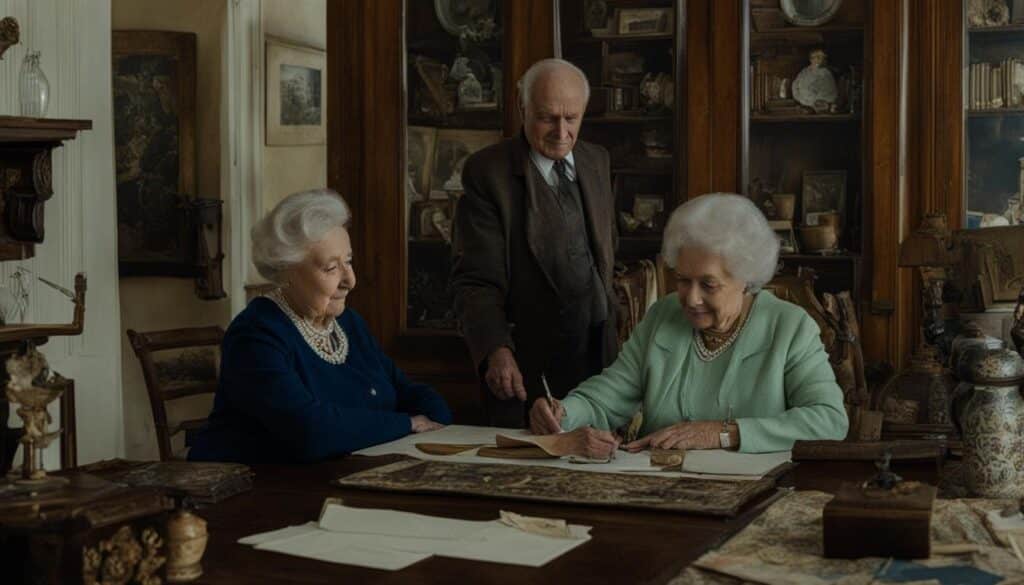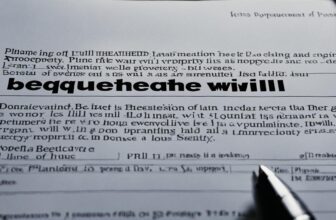
While navigating the complexities of elder estate planning, senior citizens often face unique challenges in organizing their assets and outlining their healthcare wishes for their golden years. With the right strategies and guidance, individuals can address these issues head-on and secure their financial future and care needs, while minimizing stress and legal hurdles for themselves and their loved ones. By understanding the many facets of estate planning – such as wills, trusts, and healthcare directives – seniors can make informed decisions, tailored to their individual circumstances and goals.
Through proactive elder estate planning, seniors can be confident that their wishes and values will be respected and implemented, ensuring a lasting legacy that benefits both their families and their personal peace of mind.
Understanding the Fundamentals of Elder Estate Planning
Elder estate planning is essential for seniors, as it involves preparing a collection of legal documents that protect their assets and outline their wishes for asset management during life and after death. With a comprehensive estate plan in place, senior citizens can ensure that their assets are distributed according to their desires, even in their absence.
What Is Elder Estate Planning and Who Needs It?
Estate planning for seniors caters specifically to the needs of older individuals. It is a crucial process for ensuring the proper management, preservation, and distribution of their estate, regardless of its size. All seniors should consider estate planning, as it not only provides financial security but also offers guidance in making important decisions related to healthcare and asset allocation.
The Core Components of a Comprehensive Estate Plan
A comprehensive estate plan encompasses the core components required for effective management and distribution of assets. These key components include a will, trusts, powers of attorney, and beneficiary designations. Each serves a specific purpose, such as specifying asset allocation, minimizing tax liabilities, and empowering trusted individuals with decision-making authority.
Breaking Down Common Misconceptions
There are several misconceptions about estate planning that cause some seniors to forgo this crucial step. Estate planning is not just for affluent individuals; every senior citizen, regardless of their financial circumstances, should have a plan in place to manage and allocate their assets. Furthermore, estate planning involves more than simply drafting a will. It entails addressing health directives, financial powers of attorney, trusts, and other elements that ensure the proper management and distribution of an individual’s estate according to their wishes.
The Importance of Establishing a Will for Seniors

Establishing a will is a crucial aspect of elder estate planning as it outlines the distribution of assets for seniors after their passing. It ensures a hassle-free administration of the estate according to one’s preferences and minimizes potential disputes among heirs. This part of the estate planning includes defining the role of a will, executor selection, and the inclusion of personal letters for clarity.
Defining the Role of a Will in Asset Distribution
A will is a legal document that outlines how an individual’s assets are to be distributed upon their passing. It allows seniors to specify who should inherit their possessions, ensuring the rightful beneficiaries receive what the testator intended. A comprehensive will protects the estate from potential disputes and eases the burden on family members by clarifying the asset distribution for seniors.
Executor Selection: The Key to Carrying Out Wishes
Selecting a reliable executor is crucial for fulfilling the directions outlined in the will. The executor’s role includes managing the estate, paying debts, and distributing the assets to the specified beneficiaries. Seniors often choose a trusted family member or a close friend as their executor. It is essential to have open communication with potential executors and beneficiaries to ensure understanding and alignment with the senior’s intentions, ultimately preventing future conflicts.
Incorporating Personal Letters to Explain Your Decisions
Including personal letters alongside a will can provide valuable context for the decisions made regarding asset distribution. These letters allow seniors to explain their preferences more thoroughly, offering insight into the reasoning behind their choices. Personal letters foster understanding and may reduce tension among heirs by providing a clearer picture of the testator’s wishes.
In conclusion, establishing a will is a vital aspect of elder estate planning, playing a significant role in asset distribution for seniors. Selecting a reliable executor and incorporating personal letters are essential components that contribute to carrying out one’s wishes and maintaining harmony among heirs and beneficiaries.
Strategies to Avoid Probate and Safeguard Your Estate

One key aspect of elder estate planning is avoiding probate, a process that can streamline asset distribution while reducing legal expenses and time delays. Probate, which involves court supervision over the distribution of estate assets, can consume up to 10% of an estate’s value. Therefore, considering alternatives like trusts is exceptionally beneficial for safeguarding your estate and implementing effective estate protection strategies.
Trusts provide a way to bypass probate and offer various advantages. They can impose conditions on asset distribution, yield potential tax benefits, and protect your estate from creditors. Furthermore, trusts help ensure your beneficiaries receive their inheritance promptly and without unnecessary court interference.
With the guidance of an experienced legal professional, you can craft a comprehensive trust plan tailored to your unique situation. This can contribute to the efficiency of your estate planning efforts, including selecting the right types of trusts and protecting your financial legacy.
Taking steps to avoid probate goes beyond merely establishing trusts. Key measures include properly titling assets, designating beneficiaries on life insurance policies and retirement accounts, and making gifts during your lifetime. As part of your estate planning journey, it is crucial to continually update and revise your documents and beneficiary designations, to ensure your estate remains well-protected and in accordance with your wishes.
Trust Formation: Tailoring to Individual Senior Needs

Trusts are versatile and customizable tools within elder estate planning that can be adapted to fit the unique circumstances of each senior. They play an essential role in addressing personal requirements and fulfilling the estate planning objectives. There are several types of trusts, with revocable living trusts, irrevocable living trusts, special needs trusts, and spendthrift trusts being the most notable ones.
Revocable vs. Irrevocable Living Trusts
Revocable living trusts offer flexibility, allowing seniors to alter or dissolve the trust during their lifetime. It’s an ideal choice for those who want the freedom to make changes and retain control over their trust assets. Conversely, irrevocable living trusts are more rigid. Once established, they cannot be modified or revoked by the grantor. This permanence can lead to estate tax reductions, but it comes at the cost of the grantor’s control over the trust assets.
Special Needs Trusts: Care for Beneficiaries with Disabilities
Special needs trusts cater to beneficiaries with disabilities who rely on government assistance programs. By allocating their inheritance to a special needs trust, seniors ensure that these beneficiaries maintain eligibility for government benefits while still receiving financial support from the trust. This approach provides the best of both worlds, securing essential government aid while offering supplementary income for specialized care needs.
Spendthrift Trusts: Protecting Assets from Mismanagement
For seniors with beneficiaries at risk of mismanaging their inheritance, spendthrift trusts offer a means of protection. Spendthrift trusts allow the grantor to establish specific terms and conditions for the distribution of assets, ensuring that funds are used responsibly and appropriately. This structure provides the grantor with peace of mind, knowing that their wealth will be utilized in a manner consistent with their wishes while safeguarding the beneficiary’s interests.
In conclusion, the type of trust selected during trust formation should align with the individual senior’s needs and objectives. By carefully considering the options available and consulting with an experienced elder law attorney, seniors can ensure a comprehensive estate plan tailored to their unique needs.
Securing Future Healthcare Decisions with Advance Directives

Advance healthcare directives play a crucial role in elder estate planning. They allow senior individuals to specify their medical treatment preferences if they become unable to communicate their wishes due to illness or incapacitation. One key element of advance healthcare directives is the selection of a healthcare proxy, a trusted person who assumes the responsibility of making medical decisions in alignment with the principal’s expressed wishes.
Preparing these legal documents helps relieve loved ones from making challenging choices during emotional times. With a healthcare proxy in place and clearly documented treatment preferences, family members can focus on providing support and comfort without the added stress of uncertain medical decisions.
It is essential for senior citizens to engage in open and candid discussions with healthcare providers to better understand the potential scenarios they may face in the future. By gaining insights into possible treatment options and their implications, seniors can make informed decisions that reflect their personal values and priorities. Ultimately, advance healthcare directives not only enhance healthcare planning but also ensure that the individual’s wishes are respected and carried out even in the most challenging circumstances.

Elder law focuses on addressing the unique legal needs of senior citizens. Regulations and protections specific to elderly individuals include healthcare power of attorney and advance healthcare directives, which help safeguard their best interests in case of incapacitation. It is essential to understand the different facets of elder law to adequately protect the rights and choices of seniors.
Healthcare Power of Attorney: Delegating Decision-Making Authority
A healthcare power of attorney enables seniors to designate a trusted individual with the authority to make critical health-related decisions on their behalf. This legal document plays a vital role in situations where seniors are unable to communicate their preferences or make informed choices due to incapacitation. Appointing a healthcare power of attorney provides peace of mind for senior citizens, knowing that their medical care will be managed by someone familiar with their values and wishes. Additionally, ensuring the power of attorney is durable is crucial, as this guarantees the document remains effective even if the senior becomes incapacitated.
Advance Health Care Directives: Communicating Your Medical Preferences
Advance healthcare directives are essential components of navigating elder law services. These documents enable seniors to express their medical treatment preferences and end-of-life care options in advance. Medical personnel and family members can turn to advance healthcare directives for guidance regarding the individual’s wishes, thus eliminating uncertainties and reducing the burden of making difficult decisions in emotionally charged situations. Advance healthcare directives may include instructions regarding life-sustaining treatments, organ donation, and more, tailored to the senior’s specific values and beliefs.
By familiarizing oneself with the various aspects of elder law, senior citizens can be confident that their rights are protected and their medical preferences are honored. Utilizing the protections offered by the healthcare power of attorney and advance healthcare directives can provide clarity and peace of mind for seniors and their families as they handle healthcare decisions during challenging times.
Selecting the Right Elder Care Attorney for Your Estate
Selecting an elder care attorney is a crucial step in the elder estate planning process. These specialized legal professionals are uniquely qualified to handle the challenges faced by senior citizens, providing guidance on estate planning, healthcare directives, and long-term care planning. A proficient elder care attorney can offer invaluable assistance in navigating the complexities of estate and Medicaid planning, ensuring that seniors’ wishes are legally documented and that their estates are structured to maximize benefits and minimize taxes.
When selecting an elder law attorney, it is essential to consider their professional experience, area of expertise, and communication style. It is critical to choose a lawyer who has extensive knowledge of elder estate planning and a thorough understanding of federal and state regulations. Ideally, the attorney should have experience in helping clients establish wills, trusts, powers of attorney, and advance healthcare directives. It is also advisable to select a lawyer who is a member of professional organizations such as the National Academy of Elder Law Attorneys, as this reflects their commitment to staying updated on the latest developments in elder law.
Additionally, it is vital to select an attorney who is responsive to your needs and communicates clearly and effectively. Schedule a consultation to discuss your situation and ask questions to gauge their level of expertise and willingness to assist. This initial meeting can provide valuable insights into the attorney’s communication style and help you make an informed decision about whether they are the right fit for you and your family.
Finally, remember that the cost of hiring an elder care attorney may vary depending on their level of experience and the complexity of your case. Request a fee schedule or estimate of expenses before hiring an attorney to ensure you have a clear understanding of the costs associated with their services. Keep in mind that a well-qualified attorney can save you time and money in the long run by structuring your estate to maximize benefits and minimize taxes, making it a worthwhile investment in your family’s future.
Financial and Medicaid Planning for Long-Term Care

Elder financial planning is a critical component of estate planning, helping aging parents prepare for future needs, including potential long-term care. As seniors navigate the complexities of Medicaid and the associated costs, expert guidance from financial planners and elder care attorneys is essential to achieving peace of mind and financial security.
Elder Financial Planning: Preparing for the Future
Financial planning for seniors involves assessing assets, investments, and resources to create a comprehensive plan addressing current and future needs. With a well-devised financial strategy, seniors can enjoy their retirement years, prepare for unexpected events, and mitigate the financial burden of long-term care for their loved ones. Professional financial planners provide invaluable advice in budgeting, investment management, risk management, and retirement planning to secure a comfortable financial future.
Understanding Medicaid Planning and Eligibility
Medicaid planning is an integral part of elder financial planning, offering ways to structure finances and protect assets while qualifying for benefits. An accurate understanding of eligibility criteria, income limits, and asset requirements is crucial for seniors seeking Medicaid to afford long-term care. Expert advice from elder care attorneys or financial planners can help seniors structure their assets, set up trusts, or transfer ownership of properties, ensuring their financial wellbeing and Medicaid eligibility without jeopardizing the legacy they wish to leave behind.
By incorporating long-term care planning and Medicaid strategies into their estate plans, senior citizens can achieve financial security while facing the uncertainties of aging with confidence. Seeking professional guidance from financial planners and elder care attorneys ensures that all necessary measures are in place, providing peace of mind and a solid foundation for every senior’s financial future.
Leaving a Legacy: Reflecting Personal Values in Estate Plans

Emphasizing personal values and desired legacies plays a crucial role in elder estate planning. This process allows seniors to incorporate their ethical and emotional priorities into their estate plans, ensuring a personalized approach tailored to their unique circumstances. In this section, we’ll discuss the importance of regular review and updating of estate plans, as well as the significance of thoughtful planning in leaving a lasting legacy.
Reviewing and Updating Your Elder Estate Plan Regularly
As life changes, it’s essential to review and update elder estate plans regularly to ensure they remain aligned with an individual’s current circumstances and priorities. Life events such as marriages, births, or deaths can necessitate adjustments to estate documents, beneficiary designations, and healthcare directives. Additionally, frequent review ensures that the estate plan remains compliant with current laws, fostering a seamless execution and enhancing the preservation of one’s intended legacy.
Leaving a Lasting Legacy with Thoughtful Estate Planning
Thoughtful estate planning enables seniors to leave a meaningful impact by reflecting their personal values in estate plans. Whether it involves charitable giving, providing care for a beloved pet, or supporting a relative with special needs, incorporating personal values in an estate plan allows seniors to pass along their beliefs and commitments to future generations. A well-executed estate plan goes beyond material inheritances, emphasizing the emotional and ethical legacy that seniors wish to instill in their heirs.
Conclusion
Responsible elder estate planning is an invaluable process for senior citizens, providing financial security and peace of mind while ensuring their healthcare needs are addressed. By carefully considering essential components such as wills, trusts, healthcare directives, and power of attorney, seniors can confidently embrace their future, knowing their desires and needs are comprehensively documented and legally protected.
Embracing the Future with Confidence Through Responsible Estate Planning
Elder estate planning offers a highly personal structure for seniors, allowing them to reflect on their wishes, values, and priorities while crafting a plan that benefits their families and future generations. Collaboration with qualified professionals can ensure a comprehensive approach, encompassing crucial aspects such as legal protections, healthcare decisions, and long-term care plans.
Ultimately, taking the time to engage in responsible planning not only relieves loved ones of guesswork and emotional strain, but also solidifies a lasting, positive impact that extends well beyond one’s lifetime. As such, a well-executed estate plan is a priceless gift, allowing seniors to truly embrace their future with confidence and security.
FAQ
What is elder estate planning and who needs it?
Elder estate planning is the process of creating legal documents that dictate the management and distribution of an individual’s estate upon death or incapacitation. It is essential for senior citizens who wish to have control over their assets and ensure their end-of-life wishes are honored, regardless of the size of their estate.
What are the core components of a comprehensive estate plan for seniors?
A comprehensive elder estate plan typically includes a will, trusts, powers of attorney, and beneficiary designations. Each component serves a specific purpose, such as specifying asset distribution, empowering trusted individuals with decision-making authority, and providing various legal protections.
How can I incorporate personal values and leave a legacy through my elder estate plan?
Reflecting personal values in an estate plan may involve charitable giving, ensuring care for a pet, or providing for a relative with special needs. Regularly reviewing and updating the estate plan is essential to make adjustments according to life changes, shifts in priorities, and alignment with current laws and personal circumstances.
What is the role of an elder care attorney in estate planning?
An elder care attorney is a legal professional specialized in handling the unique challenges faced by senior citizens. They provide guidance on estate planning, healthcare directives, and long-term care planning, helping seniors navigate the complexities of estate and Medicaid planning and ensuring their wishes are legally documented.
How can I ensure that my future healthcare decisions are secured?
Securing future healthcare decisions can be achieved through advance healthcare directives, which allow individuals to specify their medical treatment preferences in situations where they may be unable to communicate. This includes selecting a healthcare proxy who will assume the responsibility of making decisions in alignment with the principal’s wishes.
What strategies can I use to avoid probate and safeguard my estate?
Avoiding probate and safeguarding your estate can be accomplished through the use of trusts, which provide a way to bypass probate, impose conditions on asset distribution, and yield potential tax advantages. Trusts can also protect the estate from creditors and ensure that beneficiaries receive their inheritance promptly and without unnecessary court interference.
What are the different types of trusts and how can they be tailored to individual senior needs?
Some common types of trusts include revocable living trusts, irrevocable living trusts, special needs trusts, and spendthrift trusts. Each type serves a specific purpose and can be tailored to individual senior needs, such as offering flexibility, reducing estate taxes, ensuring care for beneficiaries with disabilities, or protecting assets from mismanagement.
How can I prepare for potential long-term care needs through financial and Medicaid planning?
Understanding Medicaid planning and eligibility is integral to preparing for long-term care needs, as it offers ways to structure finances to qualify for benefits while protecting assets. Seeking professional advice from financial planners or elder care attorneys can ensure that all necessary measures are in place for financial security and peace of mind for senior citizens.






